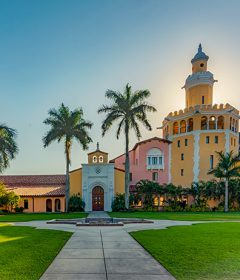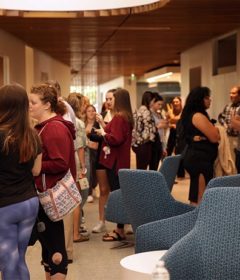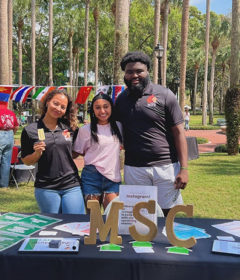Stetson Alumni Promote Sustainability for Businesses
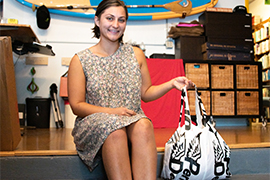
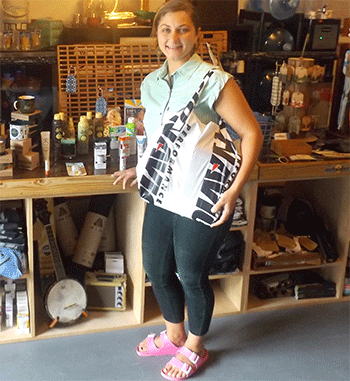
Stetson University/Ciara Ocasio
When Abbey Ramsbottom worked as a waitress at BakeChop, she was glad to know the downtown DeLand restaurant used eco-friendly, biodegradable hay straws instead of plastic straws that would linger in landfills for two centuries.
But not everyone shared her joy.
“Some people complained,” says Ramsbottom, a 2018 Stetson graduate with a double major in Art History and Spanish. “They [would say], ‘I like my plastic. Why are you taking away my plastic?’”
Ramsbottom hopes that Overlap DeLand, a nonprofit organization where she serves as director, can encourage other businesses — and, therefore, consumers — to adopt more environmentally sustainable and socially conscious practices.
That goal is succinctly summarized on the Overlap DeLand Facebook page: “Aligning ethical practice with business profit.”
One initiative taking successful steps toward that goal is the BYO campaign, which has enlisted DeLand businesses and shoppers to abandon single-use plastic bags for reusable ones created by Fliteline, a local firm, from parachute fabric.
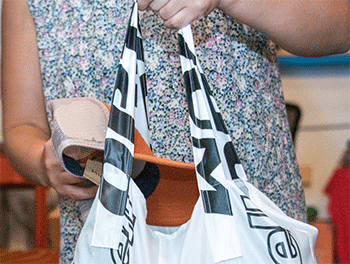
Stetson University/Ciara Ocasio
Overlap DeLand buys the bags in bulk and wholesales them to area businesses. Patrons purchase the reusable bags for $5 from participating businesses, such as Gurrs & Purrs, the store at the Museum of Art-DeLand’s downtown gallery, Nest, Pretty Little Things, Pinup Parlor, Ms. Preppy Pants Ladies Consignment Boutique, Lace & Accessories and Outsiders. Patrons then receive various incentives to use the bags, including discounts when they make purchases or, in the case of the museum, free admission.
Other DeLand businesses have expressed interest in joining the campaign, according to Ramsbottom.
Participating businesses can be identified by a “BYO” window sticker or placard, as well as drawing displays of a tote bag, cup, fork and straw.
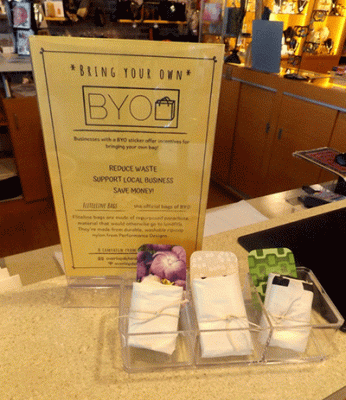
Stetson University/Ciara Ocasio
“The bring-your-own-bags campaign has been widely successful, and I think it’s because they are super accessible,” says Ramsbottom, who works at Outsiders and currently serves as interim co-coordinator at Stetson’s Hand Art Center. “It’s easy to purchase a bag and then receive these discounts. But when it comes to bringing your own straw, bringing your own to-go container, bringing your own coffee mug, it’s a little bit more inaccessible.”
Overlap DeLand is “still working out how we can incentivize” such practices, Ramsbottom notes.
The nonprofit’s roots go back to “The Ethical Incubator,” an honors course created by Stetson student Enric Cordoba before his graduation in 2017.
Cordoba envisioned the course leading to the creation of “a nonprofit that would be a no-cost consultant for ethical business practices,” Ramsbottom says. When Cordoba returned to his native Spain after graduation, he handed the idea and the preliminary groundwork to Ramsbottom.
A name change was in the works when Ramsbottom became the venture’s new director shortly after her graduation, and she filed the paperwork that made Overlap DeLand an official 501(c)(3) nonprofit in May 2018. A board of directors was established and includes local business owners and Stetson alumni.
Board member Sean Tamm, a 2009 Stetson graduate with a dual degree in finance and economics, could serve as the unofficial “poster boy.” As a youngster growing up in Venice, Florida, he and his family would spend their summer vacations in the Great Smoky Mountains at his grandfather’s “old, old cabin” outside of Franklin, North Carolina, Tamm remembered.
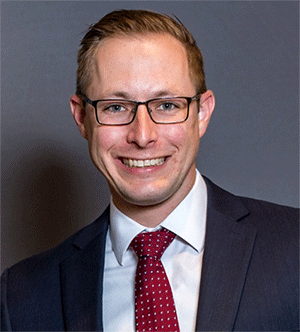
Thus was born his love of nature and national parks, even as his profession now finds him behind a desk, crunching numbers and seeking to maximize the finances of his clients as a financial adviser with Edward Jones, with his office in downtown DeLand.
“The whole concept of people bringing their own container or whatever else might be required to replace a single-use item, that is helpful not only for the environment, but it also actually is helpful for the business,” Tamm says. “That’s less than they have to spend on single-use items. But the hard part is that it’s more of a cultural change than a policy one.”
Board member Maxwell Droznin, who worked at Stetson’s Center for Community Engagement after graduating from the university in 2016 with a degree in Russian Studies, says Overlap DeLand began “as this no-cost ethical business consulting model, with our board of directors contributing best practices for a whole menu of options that business owners could take from.”
Droznin is known as the “garden guy” on the board due to his experience with the community garden in the Spring Hill section of DeLand, an effort spearheaded by the Center for Community Engagement.
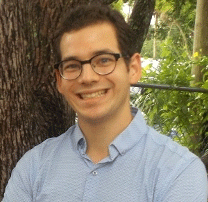
Environmental sustainability “is the direction that, like it or not, all businesses are going to have to move to eventually,” comments Droznin, who hopes to serve in an advisory capacity while attending the University of Central Florida College of Medicine, starting this month. “Once the realities of climate change become harder and harder to deny, we’re going to have to start using more reusable products. We’re going to have to start developing a business model founded in sustainability, because eventually there’s going to be no other way around it. As a business owner, you’ve probably got a million different things that you are trying to juggle, even if you’re interested in adopting more sustainable business practices. You might not always have the time to get to that, so let us help with that.
“We also want to promote businesses and make it easier for consumers to know somebody who has a bring-your-own campaign — that this is somebody who’s at least taking the first steps toward a more sustainable model.”
According to Tamm, there “are some simple changes that we try to help share with businesses.”
“There is a habit right now when you get a to-go order [from an eatery], they automatically throw plastic silverware in whether people have requested it or not,” he says, adding that Overlap DeLand suggests restaurants “have an ask-only policy when it comes to single-use items.”
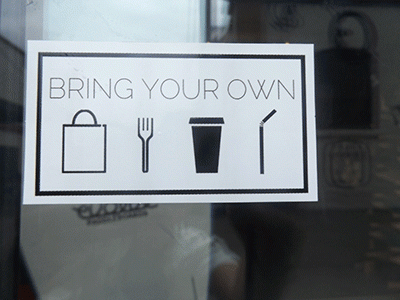
Overlap DeLand, Tamm believes, “is certainly an organization where we’re not looking for some type of massive upheaval. It’s incremental change.”
The mission statement and goals detailed on Overlap DeLand’s Facebook page cite not only environmentally sustainable practices, but also “socially conscious business practices.”
“We still have a long way to go with that aspect,” Ramsbottom says. “Environmental ethics are trendy right now, they’re practical and people are interested in that. My game plan has been to lead people where they are interested, where they can get on board and then keep moving forward from there.”
Ramsbottom concludes that while the nonprofit is still in its “baby stage,” there is a sense of urgency. And she is optimistic bigger changes can be made.
“Someone like me, who didn’t study science or environmental studies, can still be educated and change their daily practice to better the environment,” she says. “It’s really easy these days to compost your own food scraps or wash your plastic bags. Sometimes it’s hard to change your day-to-day practices. I think when you get over that hump, though, it becomes second nature to wash reusable straws or bring your own tote bag to the grocery store.”
– Rick de Yampert

